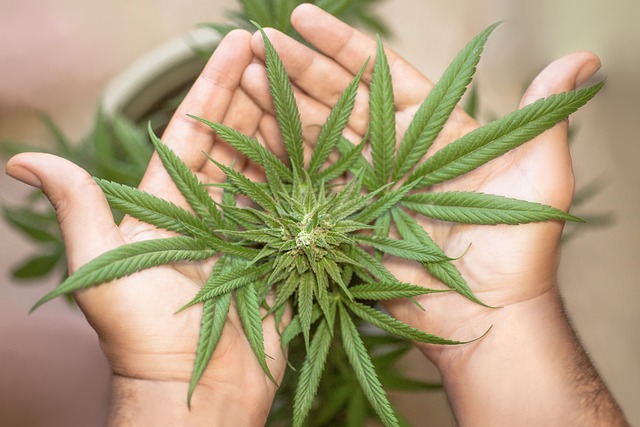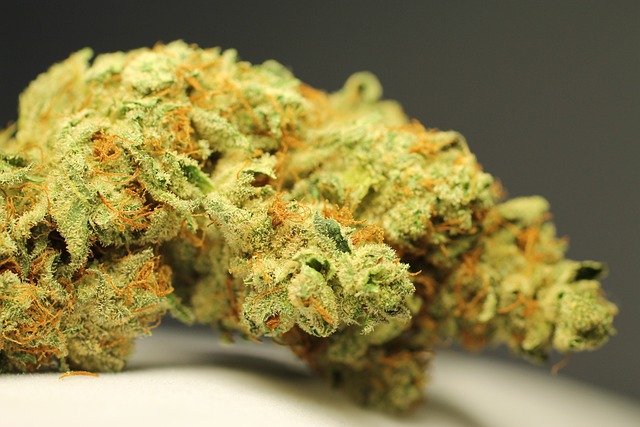2019 Farm Bill regulations have federally legalized hemp-derived products like THCA flower within Alabama, where it is now legal under state laws through the Industrial Hemp Research Pilot Program. THCA, a non-psychoactive compound found in hemp, has gained attention for its potential wellness benefits and is becoming a prominent topic due to its legal status in Alabama. While THCA itself doesn't cause psychoactive effects, it can decarboxylate into THC, which does. Consumers interested in THCA flowers must be cautious about sourcing to ensure compliance with state regulations and to avoid products mistakenly labeled as THCA but containing THC. It's important for users to understand that while THCA has mild psychoactive effects and common cannabinoid-related side effects like dry mouth and red eyes, it can interact with other medications and may affect those with pre-existing health conditions. Users should only purchase THCA products from reputable vendors to ensure proper labeling and safety. As THCA's legal standing in Alabama is defined by specific regulations, individuals must verify its legality for their intended use, whether medicinal or recreational. It is crucial for potential users to approach THCA flowers with informed caution and possibly seek advice from healthcare professionals to navigate this evolving landscape responsibly.
Exploring the nuances of THCA flower side effects within Alabama’s evolving legal framework, this article sheds light on the implications and usage considerations for residents. As THCA becomes legally accessible in Alabama, understanding its effects and how they align with state regulations is paramount. Dive into an informative discussion on the safe and responsible use of THCA flower amidst these new legal parameters.
THCA Flower Usage and Its Side Effects in Alabama's Legal Landscape

In Alabama, the legal status of THCA flower has been a subject of evolving legislation. With the passage of the 2019 Farm Bill, hemp-derived products containing less than 0.3% THC became federally legal, paving the way for various cannabinoid products to enter the market in states where they are legalized. Alabama’s laws have followed this trend, allowing the cultivation of industrial hemp under the Alabama Industrial Hemp Research Pilot Program. This has opened avenues for consumers in Alabama to legally access THCA flower, provided it meets state regulations. Users in Alabama interested in the potential wellness benefits of THCA must be cautious and ensure their source is compliant with both federal and state laws.
THCA, or Tetrahydrocannabinolic Acid, is a non-psychoactive cannabinoid found in raw cannabis plants, which can convert into THC when heated. The side effects of THCA flower are an area of ongoing research, as its psychoactive counterpart THC has well-documented effects. Reported side effects may include mild psychoactive effects, depending on the dosage and individual sensitivity. Other potential side effects could include dry mouth, red eyes, drowsiness, or a decrease in blood pressure. Users should approach THCA flower with caution, especially if they have pre-existing health conditions or are taking other medications. It is crucial for consumers to purchase products from reputable sources to ensure they are indeed THCA flower and not mislabeled THC products, which could lead to unexpected effects due to varying levels of potency.

THCA, or tetrahydrocannabinolic acid, is a naturally occurring compound found in the Cannabis sativa plant and is considered the precursor to THC, the psychoactive component of cannabis. As legal landscapes evolve, including in Alabama where laws have become more lenient, there has been increased interest in the various compounds derived from cannabis and their potential effects. In Alabama, the legality of THCA flowers is subject to specific state regulations, with certain conditions and limitations applied to their use and possession. It’s crucial for individuals interested in exploring THCA flowers to first verify their compliance with state laws, as the legal status can vary depending on the cannabinoid’s intended use, whether it’s for medical or recreational purposes. While THCA itself is non-psychoactive, its conversion to THC can lead to psychoactive effects when properly decarboxylated. Users should be aware of the potential side effects associated with THCA flowers, which may include dizziness, dry mouth, and red eyes, among others. Additionally, due to the variability in cannabis strains and product purity, individuals are advised to consume THCA flowers responsibly and consider consulting healthcare professionals before use, especially if they have underlying health conditions or are taking other medications. As with any substance, understanding its legal status and potential impacts on one’s health is paramount for a safe and informed experience.
In conclusion, the emergence of THCA flower as a legal entity within Alabama’s regulatory framework presents a nuanced landscape for consumers and policymakers alike. While THCA flower offers potential therapeutic benefits, it is imperative to recognize and understand its side effects, which can range from mild to severe. As the legal status of THCA in Alabama continues to evolve, users must approach its use with caution, adhering to recommended dosages and consulting healthcare professionals when necessary. The implications of incorporating THCA flower into wellness routines are subject to ongoing research, underscoring the importance of a responsible and informed approach to its consumption. Users are encouraged to stay informed on the latest developments in state legislation and scientific findings regarding THCA’s effects to ensure safe and compliant usage within the legal boundaries established by Alabama law.
